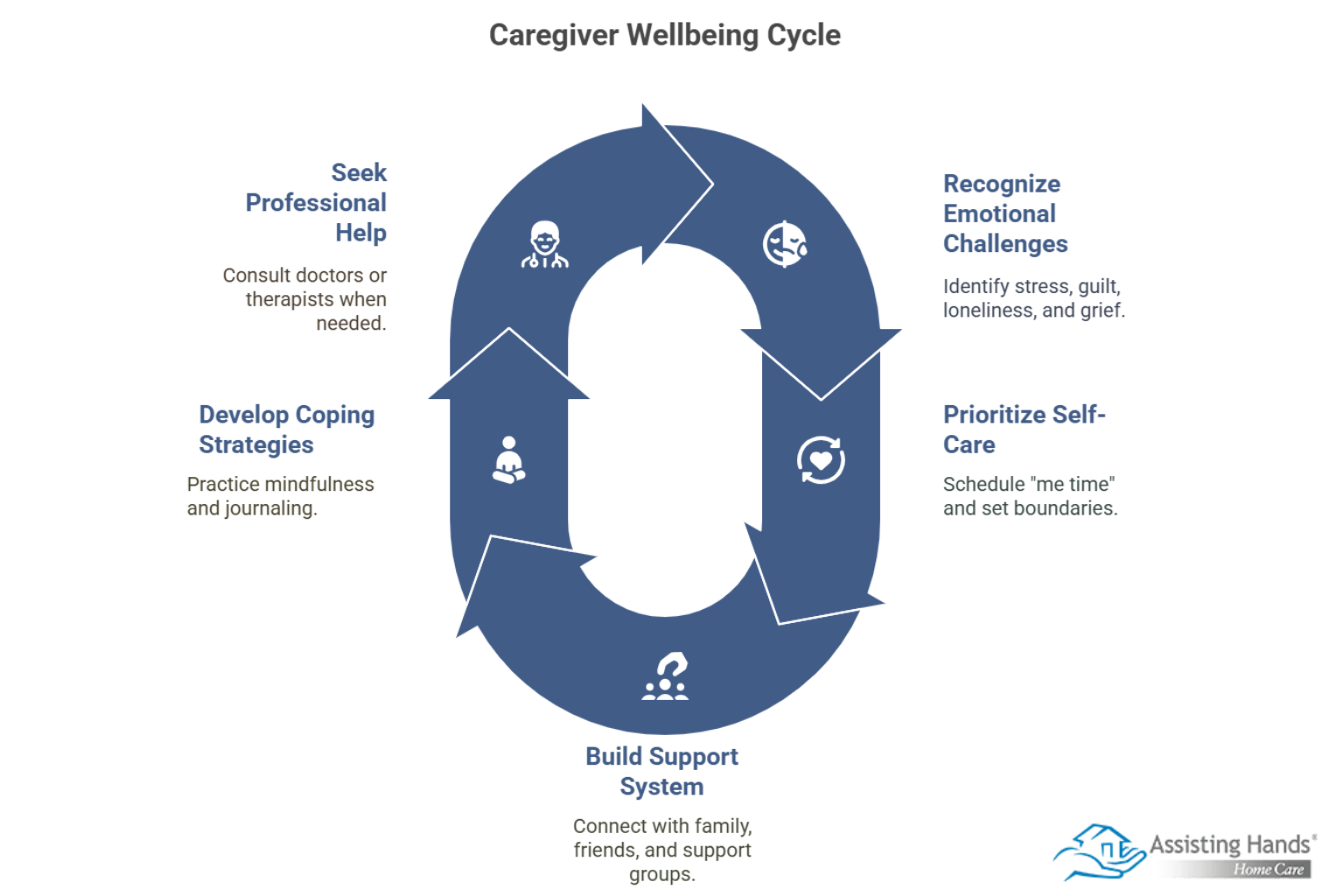
Table of Content
Caregiving is an act of love and dedication, but it comes with a unique set of challenges. While most discussions around caregiving focus on physical responsibilities, the emotional aspect often gets overlooked. Here’s a closer look at the complex emotional toll of caregiving and practical strategies to help caregivers maintain their wellbeing.

The Emotional Challenges Caregivers Face
Caregiving can be a deeply rewarding experience, yet it often comes with emotional hurdles.
- Stress and anxiety – Juggling caregiving responsibilities with personal and professional commitments can lead to immense stress. Caregivers may feel overwhelmed trying to balance competing demands.
- Guilt – Many caregivers experience feelings of guilt, particularly when they feel they’re not doing enough or need to take time for themselves.
- Loneliness – Caregiving can be isolating. Friends may pull away due to misunderstandings about the time commitment involved, leaving caregivers feeling disconnected.
- Grief and sadness – Watching a loved one’s health worsen can trigger intense sorrow and anticipatory grief.
Understanding these emotions is essential for managing them effectively.
Seniors can face a variety of age-related challenges. Though some families choose to take on the caregiving duties, there may come a time when they need a trusted elder care provider. Families sometimes need respite from their duties so they can focus on their other responsibilities, and some seniors need around-the-clock assistance that their families are not able to provide. Assisting Hands Home Care is here to help.
The Importance of Self-Care
Caring for yourself is necessary for you to continue providing support. Here’s how to prioritize self-care as a caregiver:
- Schedule “me time” – Block out time for activities you enjoy, whether it’s reading, exercising, or simply resting.
- Set boundaries – Learn to say no or delegate tasks when necessary. Allowing yourself to share responsibilities can lighten your load.
- Seek professional help – Consider therapy or counseling for a safe space to express emotions and receive guidance on coping strategies.
- Focus on physical health – Regular exercise, a balanced diet, and adequate sleep contribute immensely to emotional resilience.
Taking care of yourself isn’t just good for you. It also enables you to care for your loved ones more effectively.
Building a Support System
No one should have to face caregiving challenges alone. Building a network of supportive individuals can make all the difference.
- Family and friends – Open lines of communication with family members and friends. Share your challenges and seek assistance when needed.
- Caregiver support groups – Joining a group of people who understand your experience can provide emotional relief and practical advice.
- Professional networks – Organizations like the Family Caregiver Alliance or National Alliance for Caregiving offer resources tailored to caregivers.
- Respite care – Explore options for temporary professional caregiving so you can take a break without compromising your loved one’s care.
Remember, asking for help is a sign of strength, not weakness.
Family caregivers need to care for their own wellbeing. If you’re caring for an aging loved one and are feeling overwhelmed, consider hiring a professional caregiver to provide respite care. Potomac families who want to prevent burnout can turn to Assisting Hands Home Care. One of our professional caregivers can assist your loved one at home while you take a nap, go to work, run errands, or go on vacation.
Developing Coping Strategies
Caregivers often find themselves in emotionally taxing situations. The following coping strategies can help you stay emotionally balanced.
- Mindfulness practices – Techniques like meditation, deep breathing, and yoga can reduce stress and increase concentration.
- Journaling – Writing down your feelings can help you process emotions and identify patterns that need addressing.
- Focus on achievements – Celebrate small victories, whether it’s managing a challenging day or finding a resource for extra help.
- Stay connected – A phone call, video chat, or coffee with a friend can be a boost to your emotional wellbeing.
Finding what works best for you is key to developing resilience as a caregiver.
Recognizing When You Need Professional Help
While caregiving can be emotionally challenging, sometimes the toll becomes unmanageable. Be on the lookout for signs like chronic fatigue, mood swings, or feelings of hopelessness.
- Talk to your doctor – Discuss any noticeable changes in your mental or physical health. Medical professionals can offer advice or refer you to specialists.
- Explore counseling – Therapists or counselors trained in caregiving challenges can offer personalized coping tools.
- Be open to medication – For some, managing emotional stress may require medication. Consult a healthcare provider to explore this option if necessary.
Acknowledging when you need extra help is a brave and important step in your caregiving journey.
If you’re feeling stressed and overwhelmed by your caregiving responsibilities, a professional caregiver can provide the support and encouragement you and your loved one need. Families looking for top-rated Potomac homecare providers can reach out to Assisting Hands Home Care. From respite care to specialized Alzheimer’s, dementia, stroke, and Parkinson’s care, there are many ways we can make life easier for seniors and their loved ones. Call one of our Care Specialists today to learn about our customized in-home care plans.







